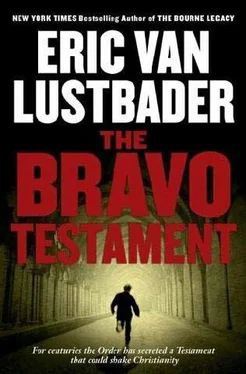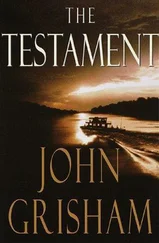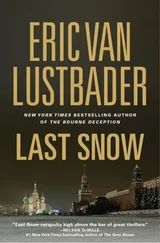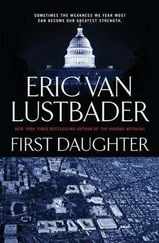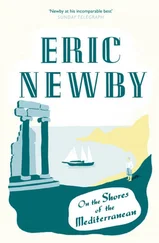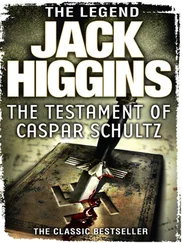The church presented an elegant facade to the street down which they walked, a remarkably simple affair, at least in terms of Venice's hyperventilating architecture. The only Greek Orthodox church in Venice, it had been built in 1539 when there was a thriving Greek population, many of whom had traveled for centuries with the seafaring Venetians to the Levant and settled in important trading communities along the south coast of the Black Sea, where their religion became the dominant form of worship until the Muslim Ottomans drove them from Trebizond in the fifteenth century. Now there were less than a hundred Greek Orthodox in all Venice.
The interior of the church, with its high, barrel ceiling, seemed empty and cavernous. There were few people about-! an old woman kneeling, her hands clasped, as she faced the enormous gilt cross, a heavy man with tousled hair in earnest conversation with a tall, cadaverous priest with a humpback under his long black cassock.
The lack of people seemed endemic, as if something vital had hollowed out the interior, keeping intact the magnificent architecture and sculpture but leaving behind, as after a receding glacier, the peculiar barrenness of a moraine-a landscape devoid of both plants and the earth in which they would grow.
Like all Greek and Russian Orthodox churches, San Georgio dei Greci had a notable iconostasis, a wall of icons that was Byzantine in origin. Historically, the iconostasis had served as a kind of threshold or fence, a symbol of the division between the sanctuary and the nave, between heaven and earth, the divine and the mortal, but over the years it evolved into a wall into which the individual icons were set. As with all religions, what had once been correctable was now quite literally set in stone.
As soon as the tall priest noticed them, he broke off with the heavyset man and came over to where they stood.
"My name is Father Damaskinos," he said in a voice that made it seem as if his mouth was full of gravel.
Italian wasn't his first language, Bravo thought, and so he replied in Greek, giving their names.
The priest's eyes opened slightly in surprise and delight. "You speak Greek very well, what other languages do you know?"
"Trapazuntine Greek," Bravo said.
Father Damaskinos laughed softly. He had shoulders like a wire hanger and the head, small-eared and large-toothed, of a leopard. His hunchback was slight, from some angles seeming not to exist, so that he appeared, like many others of his height, merely stoop shouldered.
He replied in the same ancient form of his language, "Then of course you must have come to the Church of San Georgio dei Greci for a specific reason."
"I've come," Bravo said, "to see the crypt."
"Crypt?" Father Damaskinos's narrow brow furrowed deeply. "You are misinformed. We have no crypt here."
Bravo turned to Rule. "Uncle Tony, do you know this man?"
Rule shook his head. "He is not one of us."
Father Damaskinos's black eyes seemed lit from within his leopard's skull. "One of us? What does this mean?"
"Bravo, we have no time for this," Rule said.
Nodding, Bravo took out the Greek cross and held it in his open palm. For a moment Father Damaskinos said nothing. Then he took it as gingerly as if it were a scorpion. He examined every inch of it, most of all the inscription.
At length, he returned the cross to Bravo's palm. "Where are the red threads?"
"Gone," Bravo said.
"Did you count them?"
"There were twenty-four."
This odd exchange had the terse, staccato tempo of a spy's recognition code.
"Twenty-four," Father Damaskinos said. "You're certain? No more, no less?"
"That's right. Twenty-four, exactly."
"Come with me." Father Damaskinos turned abruptly on his heel, leading them across the checkerboard floor, to a door at the extreme left side of the iconostasis. Inside was a tiny space, seemingly carved out of the church's stone blocks. Father Damaskinos took a torch from a black wrought-iron ring set into the wall and lit it.
"For obvious reasons," he said, "there is no electricity in the crypt."
They descended a spiral staircase, its marble treads so well worn they dipped in their centers. Because this was Venice, the crypt was not as far down as it would have been in cities built on dry land. It was damp and cold as a refrigerator. The stone floor was awash in water and, here and there, tiny shelled creatures marched up and down the slick walls, their multiple legs clicking like the pens of an army of clerks.
"Our crypt is a secret place, its existence zealously guarded."
The crypt was larger than Bravo had expected. Two rows of stone sarcophagi stretched away from them, separated by a narrow aisle. Into the lid of each sarcophagus was carved the likenesses of those buried inside. Some held crosses, but others clasped swords to their chests.
Father Damaskinos faced Bravo. "You are Dexter's son, are you not?"
"Yes. How did you know my father?"
"We had a friendship based on mutual trust, we believed in the same thing: the overarching power of history. Your father was a great student of history, you know. Occasionally, I would translate ancient documents that even he couldn't decipher. In return, though I never asked for it, the church received a monthly stipend from an account that Dexter set up for the purpose."
Father Damaskinos addressed Rule. "You appear surprised that he would turn to someone outside his Order, but consider: for centuries, there has been an alliance between the Order and the Greek Orthodox-the Orthodox Church having provided the Order with information and even secret documents in the early days when members of the Order traveled to the Levant-Samsun, Erzurum, Trebizond. This alliance was a natural one, born both of necessity and self-defense since both the Greek Orthodox Church and the Order were enemies of the pope."
They walked through the water, down the aisle. It was curious, Bravo thought, that though this was the resting place of the dead, he could sense more life down here than he had in the church above. Like his father, he had an acute sense of history. For him, history was a living thing with an endless supply of stories, of lessons to apply to the present of one's own life. He could remember innumerable times he and his father had read historical texts-their favorites the living words of those who had lived through history, unaltered and unexcerpted by historians with their own perspectives, their own axes to grind. The danger in studying history, Dexter had told him, was in not going to the source.
"So you have become part of the Voire Dei," Father Damaskinos said, "and now nothing seems the same."
"I felt that way the moment my father died."
"I, too," the priest said soberly. "Your father was a unique individual. I wonder whether you are like him."
"You mean his gift of prescience."
Father Damaskinos nodded. "Your father saw the battle that began in the Voire Dei and spread to the world outside in, shall we say, larger terms than the others. He saw that the battle had commenced on political terms, that it had remained so for centuries. In the fifteen hundreds it might have had the trappings of a religious conflict, but the underlying motivators were strictly political. Centuries later, those, like the Communists, who refused to recognize the changes afoot, who couldn't see that the battle had shifted to economic terms, were doomed.
"The lust for economic supremacy is the engine that has driven the Voire Dei-as well as the larger world-for more than twenty years now. It, like the idea of political power before it, has become so entrenched in the thinking of the participants that they have become as blind as the Communists to the changes at work. But your father knew-he saw that the imperative of economic superiority was slowly being eroded by the rise of religious conflict. The so-called economic reasons for the conflict-that is, the scramble for oil-were once again trappings. You see the importance of history? Beneath those false trappings is the religious motivator.
Читать дальше
